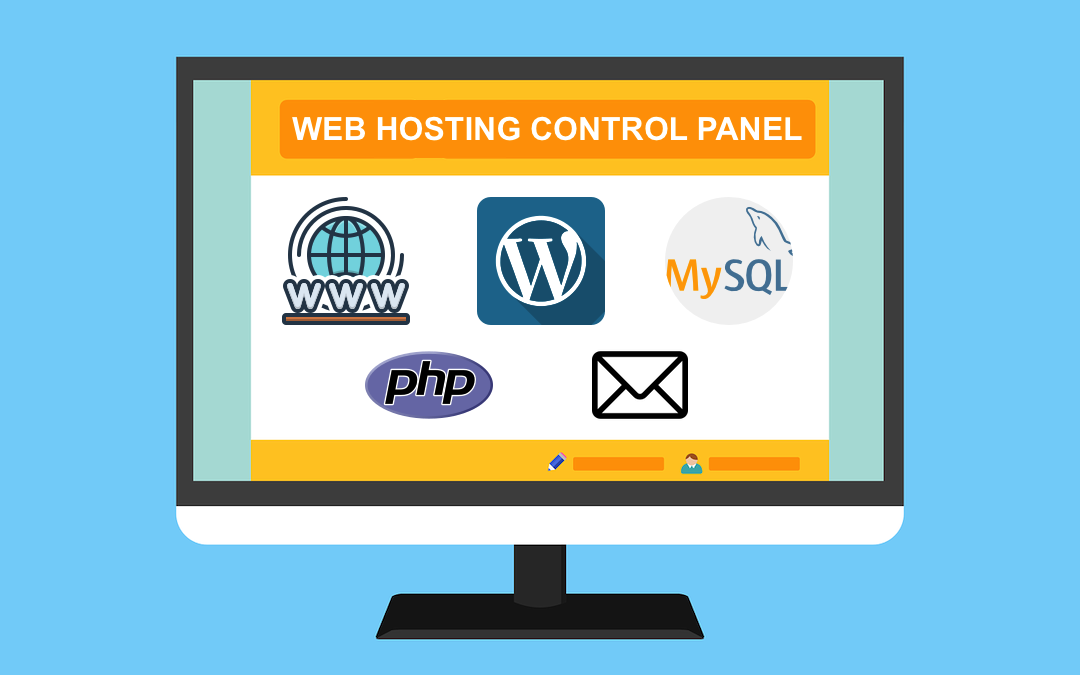
Managed hosting is when a third-party hosting company handles the setup, administration, management, and support of a server and application.
Although management services offered by hosts differ, they usually consist of hardware and network infrastructure management, operating system (OS) updates and patching, 24/7 assistance, basic security measures (such as spam and virus protection), and monitoring and correction of any issues that might interfere with server performance.
The use of a web hosting control panel, an essential component that streamlines and simplifies server management operations, is key to these managed hosting solutions.
The following post looks at the fundamentals of web hosting control panels its advantages, and the strategic function managed hosting plays in helping companies of all kinds.
The Benefits of Using a Web Hosting Control Panel for Managed Hosting Solutions
The choice between managed and unmanaged web hosting can significantly affect your online presence's efficiency, security, and scalability. The web hosting control panel is a crucial part of managed hosting solutions, acting as an effective tool for streamlining and simplifying server administration tasks.
In particular, managed hosting allows companies to take a hands-off approach to server maintenance, enabling them to focus on their core business while leaving technical details to hosting companies.
Let's quickly understand the Managed Hosting Solution
Let's answer the obvious question "Why is hosting management necessary at all"? With managed hosting, clients can focus on their main business while the hosting provider takes care of server hardware, operating systems, and applications, giving them peace of mind.
This approach improves overall performance and dependability and guarantees the seamless operation of websites and applications.
Which Managed Hosting Features do this?
The following features and services are what make managed hosting solutions so important.
- Monitoring and maintenance of servers: Constant observation of the uptime, performance, and health of the server. Early identification and resolution of possible problems.
- Security Management: Putting strong security measures in place such as firewalls, intrusion detection systems, frequent security audits, and patch management.
- Disaster Recovery and Backup: Consistent, frequently automated data backups with established recovery strategies.
- Technical Support: Skilled technical support teams are available 24/7.
- Resource Management and Scalability: Adaptable scalability choices to meet varying resource requirements.
What is a Web Hosting Control Panel?
A control panel is a user interface used in web hosting that lets users manage their hosting plans and website information.
Control Panels allow users to control a variety of aspects of their website. These consist of apps, web files, accounts, and domain names that have been bought. File Transfer Protocol (FTP), phpMyAdmin, and other methods from the control panel allow users to access the files on their sites.
Here, site owners can also access the DNS (Domain Name System).
Users can also adjust security measures like firewalls, IP blocks, and backups using the control panel. This is also where users may view error logs and performance monitoring.
Different examples include CyberPanel, a very powerful web hosting control panel for LiteSpeed Enterprise, that simplifies database creation, enabling easy installation, configuration, and upgrades for businesses, other popular examples are cPanel, Plesk, DirectAdmin, and hPanel, which are needed for different operating systems.
Additionally, depending on the web server, control panels can differ, but they usually have the same features.
Benefits of Using a Web Hosting Control Panel
1. Easy management of hosting services
System administrators need to use an organized, effective method for managing websites because it can become tiresome and complicated. Efficient management of numerous websites, server security upgrades, backups, performance, and other aspects may be achieved with the correct hosting control panel.
Additional features that make many administration jobs easier include mail server support, automated server health checks, and one-click deployment. Web hosting requires these panels, which transform tedious administrative duties into simple, automated procedures.
2. User-friendly interface
Control panels are specifically designed to have a user-friendly interface and layout. With their user-friendly interfaces and intuitive design, web hosting control panels enable users to explore and manage hosting environments with ease. A clear interface makes all required commands easily visible on your screen. Each section's function is indicated by the buttons and icons. It reduces the likelihood of errors when handling your projects.
For marketers and business owners who may lack in-depth technical knowledge but need to properly manage and manage their internet assets, this accessibility is very helpful. Simple point-and-click operations can now complete tasks that formerly needed technical knowledge, decreasing the need for IT help and enabling users to take control of their hosting needs.
3. File management
File administration is made easier using control panels. It only takes a few clicks to view, move, or remove files. File Transfer Protocol (FTP) can transport large files quickly, efficiently, and with less complexity thanks to it.
The panel's file manager provides special features such as the option to preview your files before opening, a snapshot of content, better file organization, compress and decompress files, and also allows bulk actions like deletion or moving of your files and an improved user experience.
4. Scalability and Flexibility
Scalability becomes important when companies expand and their hosting requirements change. Scalability is provided via web hosting management panels, which make it simple for administrators to add or remove resources, assign bandwidth, and increase server capacity as needed. These systems offer the adaptability to smoothly adjust to shifting business demands, whether it's adding new apps or scaling up to handle more traffic.
5. Easy Software Installation
Users with different levels of expertise can install different apps on their websites with ease thanks to web hosting control panels, which streamline the software installation process. These panels are a recommended method for website enhancement, especially for beginners who might find manual installations challenging.
6. Automation and Efficiency
Web hosting control panel automation reduces human error and saves time by streamlining regular processes like security scans, backups, and upgrades. This boosts productivity and frees up IT staff to work on more strategic projects.
7. Domain & sub-domain management
Simple domain and sub-domain management are possible with hosting control panels. Users can easily manage their website addresses with its help. DNS settings, subdomain setup and new domain registration are all available to users.
With the help of this functionality, users can quickly build several websites or parts inside a single website, each with its unique URL.
Along with configuring email accounts linked to their domains, users may also set up handles and redirects.
Overall, consumers are guaranteed complete control over their online presence thanks to this feature.
8. Security
Easily set up access control and permissions, password security for critical sections of your website, firewall settings to prevent malicious assaults, and SSL certificates for secure data transmission.
To protect against dangerous infections, control panels frequently include integrated spam filters and antivirus software. Safeguard critical data and resources, and manage firewall setups and malware detection with the help of web hosting control panels, which come equipped with powerful security capabilities.
9. Website Management
Faster site administration possibilities are provided by hosting control panels. These control panels make tasks like setting up and maintaining domains and subdomains as well as data management easier to complete with their user-friendly interface and straightforward tools.
10. Compatibility with Operating Systems
Make sure the hosting control panel you select is compatible with the operating system on your server. Select a control panel that is compatible with the operating system on your server. For example, certain control panels are restricted to use with Linux operating systems, such as Debian, whereas others are compatible with both Windows and Linux.
Considerations Before Choosing a Control Panel
Businesses should think about things like scalability, compatibility with current infrastructure, pricing strategies, and feature requirements before choosing a web hosting control panel. Carefully weighing these considerations, it is possible to maximize the return on investment in managed hosting services by selecting a control panel that is in line with both technological capabilities and business objectives.
Here are the next steps when choosing a control panel:
- Identify Features: List and prioritize essential features like customization, performance monitoring, security, backups, file and email management, and access control.
- Compare Options: Evaluate control panels based on ease of use and integration.
- Check Security: Ensure robust integrated security features.
- Test Support: Assess customer service quality across multiple channels.
- Rate and Select: Assign ratings based on criteria to choose the best option.
6 Web Hosting Control Panel Options
CyberPanel
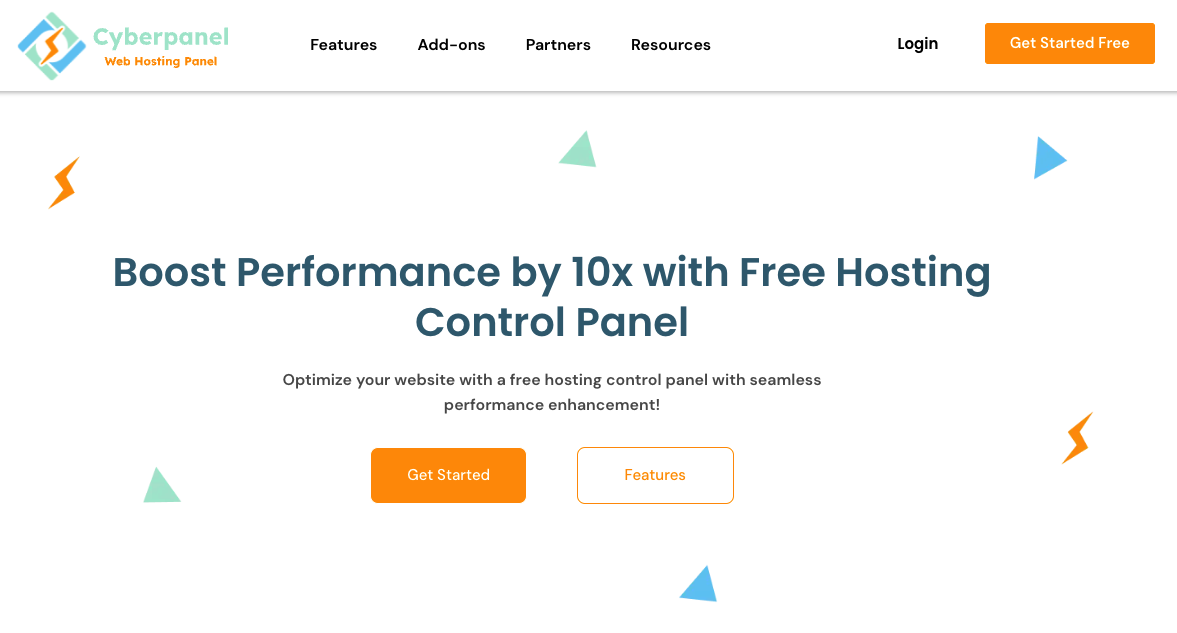
A cutting-edge, open-source web hosting control panel called CyberPanel is made specifically for OpenLiteSpeed and LiteSpeed server management. It provides easy database management, strong email setup, and extensive DNS management. It has built-in security measures for server protection, backup and restore capabilities, and support for LiteSpeed. Web hosting has never been the same thanks to CyberPanel, which offers unparalleled speed, security, and usability.
cPanel

cPanel is one of the most popular control panels used by web hosts today. It includes features such as email generation, error log management, automated backups, server performance tracking, robust security tools, database development, and file management; and they are all available with the cPanel control panel for Linux OS.
Plesk
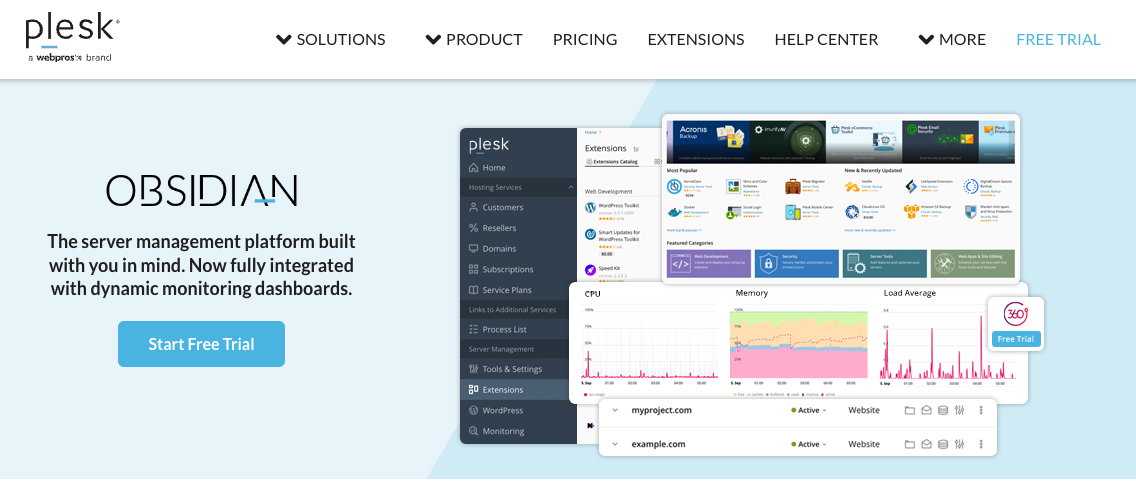
Plesk is a flexible control panel that works in a variety of hosting situations and is compatible with both Windows and Linux. It is useful for shared hosting as well as being well-liked in the virtual private server (VPS) hosting market. Task automation, restricted access mode, advanced monitoring services, and a repair kit are some of the important features.
DirectAdmin
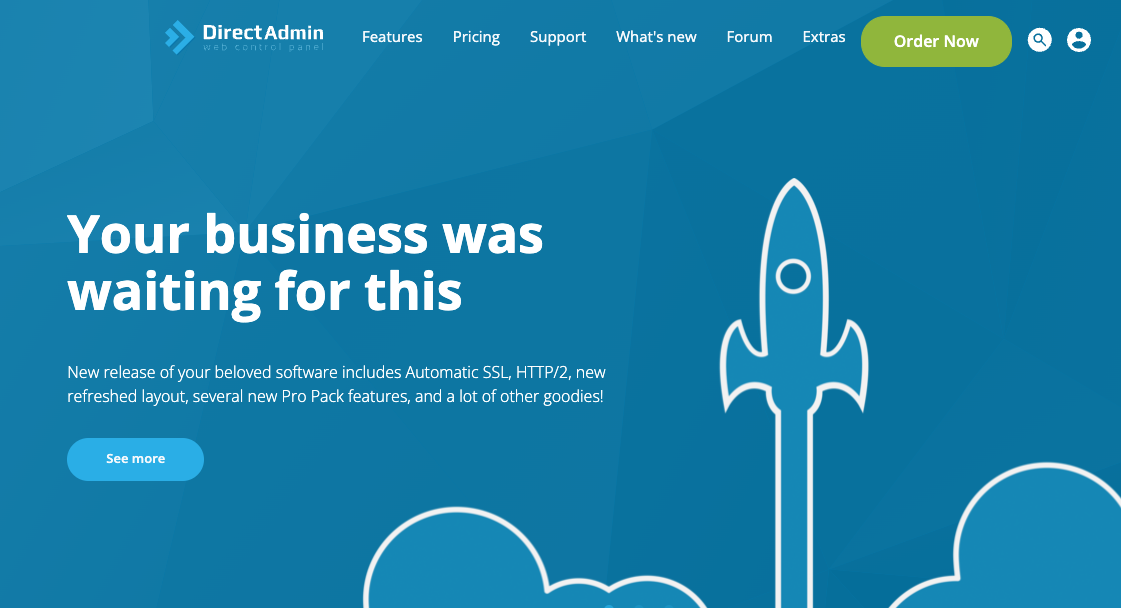
A low-cost control panel designed specifically for Linux and Berkeley Software Distribution (BSD) systems is called DirectAdmin. It provides an extensive feature set that includes file administration, DNS control, database development and maintenance, backup generation, integrated anti-spam tools, and reseller account management. It's a cost-effective and straightforward solution.
IPSConfig
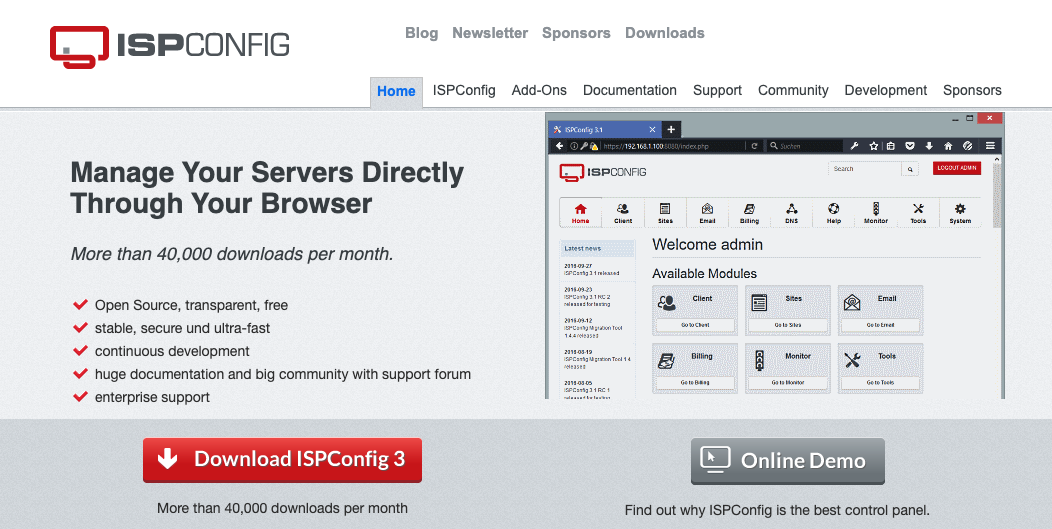
Open-source and built on Linux, IPSConfig is a control panel that may be used with some servers, including MariaDB, MySQL, Bind, PowerDNS, PureFTPD, Dovecot, Postfix, Apache2, and NGINX. Strong and adaptable web hosting is provided by its four access levels: Administrator, Reseller, Client, and Email Login.
hPanel
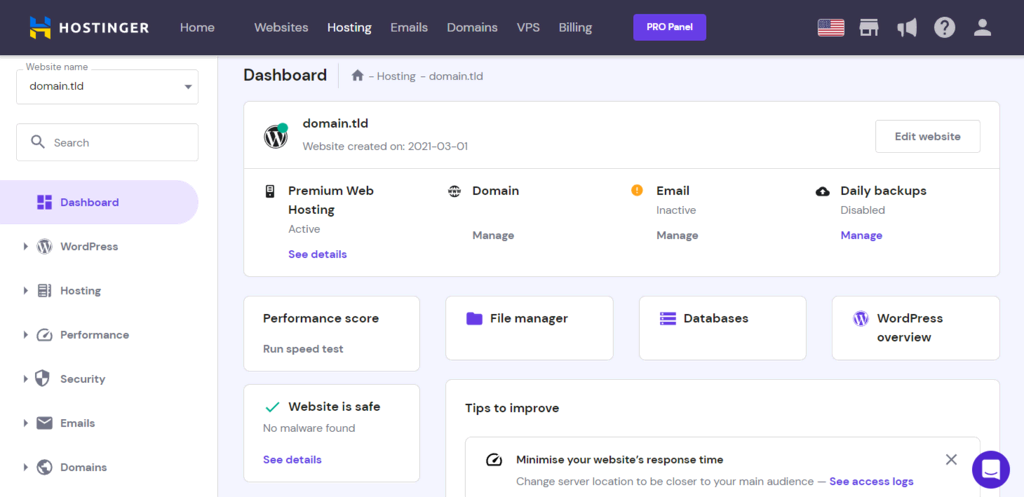
Control Panel Innovations and Trends 2024
There are a few emerging trends that we will be seeing more of in recent times and as IT Infrastructures will keep evolving.
- Green hosting: features include carbon footprint tracking and resource management that is energy-efficient.
- Improved user guides and in-panel documentation for troubleshooting and ease of use.
- DevOps Integration: The smooth integration of infrastructure as code (IaC) and CI/CD pipelines with DevOps tools and techniques.
- Improved Cloud Integration: More thorough integration for hybrid and multi-cloud setups with cloud services.
- AI-Driven Automation: Predictive maintenance, performance improvement, and task automation using AI and machine learning.
These developments are expected to improve security protocols, streamline administration duties even more, and enable companies to run their hosting operations more profitably.
AI Use Case In Control Panels
Even though machine learning (ML) and artificial intelligence (AI) seem to be in every tech device these days, they can greatly improve intuitiveness in control panels and are far more than just gimmicks.
For example
AI can analyze user behavior and assist you in optimizing server settings to improve the speed of your website.
It might also be useful for automating repetitive operations and real-time server performance monitoring.
Final Thoughts
In this post, we discussed web hosting control panels in detail. Optimizing your web hosting control panel can greatly increase the dependability and performance of your managed hosting solutions, regardless of the size of your company.
Businesses wishing to keep a strong online presence without the stress of technical issues can find a comprehensive solution with managed web hosting. It is impossible to exaggerate the advantages of having a team of experts manage the hosting of your website, from security to performance. Customization, automation, security improvements, and ongoing monitoring are all part of optimizing web hosting control panels for managed hosting.
Share this post
Leave a comment
All comments are moderated. Spammy and bot submitted comments are deleted. Please submit the comments that are helpful to others, and we'll approve your comments. A comment that includes outbound link will only be approved if the content is relevant to the topic, and has some value to our readers.


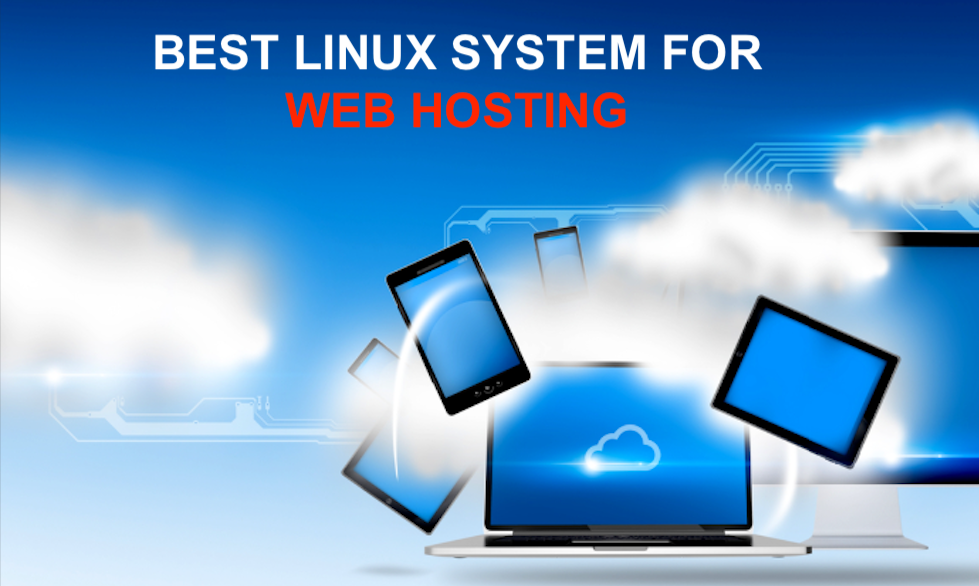

Comments (0)
No comment